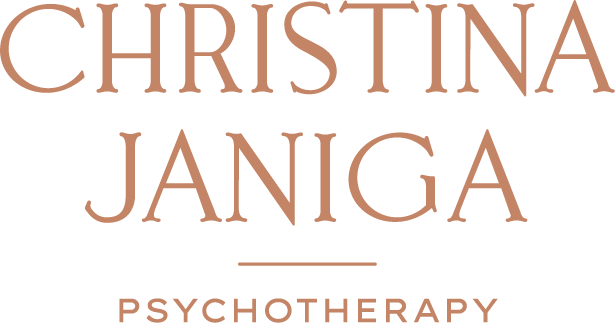Christina Janiga Psychotherapy - BLOG
This blog is not a substitute for therapy, but provide evidence-based education for the purposes of self-help and information.
How CBT Can Help With Depression

If you haven’t been feeling like yourself for a while, and nothing that normally helps you when you’re feeling down is working, you might be depressed. Feel like you’re the only one struggling like this? You are not alone. Depression is something that more Canadians struggle with than you might think. According to the Canadian Mental Health Association (CMHA), Major Depressive Disorder (MDD) affects 5.4% of the Canadian population. Depression can affect anyone, from a new parent, to first responders, and even senior citizens. While it can have serious consequences if not treated, you should know that depression is a highly treatable mental health condition. Cognitive Behavioural Therapy (CBT) is one great method in providing support for those suffering with depression.
CBT Stands For Cognitive Behavioural Therapy
Maybe you’ve heard the term CBT thrown around when doctors talk about treatments for depression, or on TV interviews, but what IS CBT? Cognitive behavioural therapy is an evidence-based (which means a lot of research and peer reviewed studies have confirmed that it works), structured form of psychotherapy that focuses on how your thoughts impact your mood and behaviour.
CBT, at its core, focuses on the fact that many mental health struggles are based, in part, on unhelpful ways of thinking or patterns of behaviour that do more harm than good. The goal in CBT is to help you to examine and challenge certain thought patterns and behaviours in order to change them and adopt healthier ways of dealing with life’s challenges.
How Does CBT Work?
This form of mental health therapy has a few different ways of being conducted. Depending on the issue that you are dealing with, your counsellor can focus on helping you to shift unhelpful thoughts (cognitive interventions) or by teaching you to change behaviours that no longer serve you (behavioural interventions). Often therapists will use a combination of both cognitive and behavioural interventions to treat depression.
Cognitive Interventions for Depression:
- Identifying unhelpful thoughts – If you are struggling with depression, you may also be thinking in a way that’s called black and white thinking (feeling sure that something is either right or wrong, with no consideration for the more ambiguous aspects of life). Or you could catastrophize situations (always thinking of the worst outcome), and/or more focused on the negative.The first step in changing your thought patterns is to become more aware of them.
- Journaling – this can be a helpful tool in order to identify how your thoughts impact your feelings and behaviours and it can be a great place to record evidence that negates unhelpful thought patterns.
- Decentering – that’s when you learn to recognize that you are separate from your thoughts “just because I think it, doesn’t mean it’s true”. Doing this makes it much easier to not get so caught up in our unhelpful thought patterns.
Behavioural Interventions for Depression:
- Behavioural experiments – these are often conducted to test the accuracy of your beliefs about yourself, others and the world. For example, if you believe that “no one likes me” may look for people who are actually like them in social settings.
- Activity scheduling – this is aimed at encouraging you to engage with your lives through pleasurable activities and at combating behavioural patterns of withdrawal, avoidance and inactivity.
- Exercise – there is growing evidence to support that physical activity can have a significant positive impact on mood. Even a simple walk can help to shift your mood and perspective on a current challenge.
Benefits of CBT for Depression
- Fosters the development of more rational thoughts.
- It can help to boost your self-esteem because you are seen as the agent of change in your own life, your counsellor is merely your guide.
- It can help you to become more mindful of your thoughts and behaviours, so that you can live more fully in the present moment.
- The skills learned in CBT can be incorporated into multiple areas of your life and help you cope better with stress overall.
- It is well structured and can be completed in a relatively short time frame (10-20 sessions) – a great option for those who have limited insurance coverage for mental health treatments.
- CBT is a researched and evidence based treatment, which means it is proven to help depression and anxiety.
- There is very little risk associated with CBT, so even if it doesn’t help you, it isn’t likely to hurt you either.
Are You Ready To Book A Session With A Psychotherapist Who Knows CBT?

If you’ve been struggling with feeling sad, or numb, or even unexplained anger, and these feelings have been bothering you for more than a few weeks and aren’t getting better, you may be depressed. Seeing a Registered Psychotherapist and trying CBT to help your depression is a great first step in getting back to feeling like yourself again. To book a consultation or a first session with one of therapists at Christina Janiga Psychotherapy click here.
Sources for this article are shared below:
https://positivepsychology.com/benefits-of-cbt/
https://cmha.ca/brochure/fast-facts-about-mental-illness/
https://www.apa.org/ptsd-guideline/patients-and-families/cognitive-behavioral
Kennerley, H., Kirk, J., & Westbrook, D. (2016). An Introduction to Cognitive Behaviour Therapy (3rd Edition). SAGE Publications, Ltd. (UK). https://online.vitalsource.com/books/9781473998254


